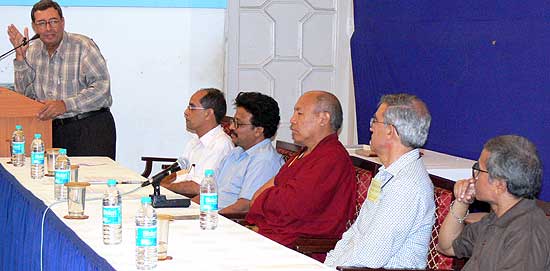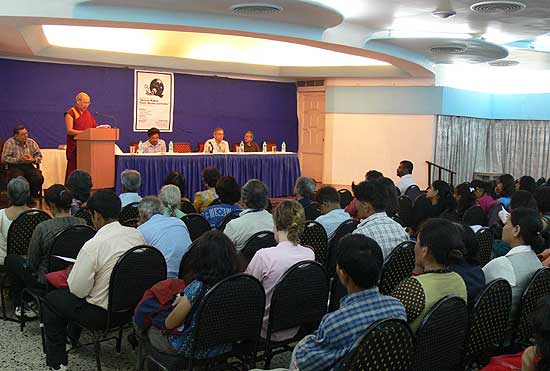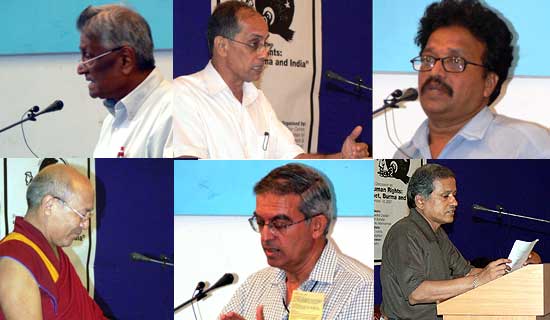|
Panel Discussion on "Human Rights: Tibet, Burma and India"
Aspi Mistry (Dharma Rain Centre) introduces speakers and panelists. (From Left): Yogesh Kamdar (National Vice President, People's Union for Civil Liberties); Dr Ramu Manivannan (Chennai University); Venerable Geshe Lhakdor (Official translator of HH the Dalai Lama); Vijay Crishna (Industrialist and Theatre Personality) and CA Kallianpur (National Coordinator, Friends of Tibet) . . . . . . . . . . . . . . . . . . . . . . . . . . . . . . . .
Dharma Rain Centre, Indian Committee for Cultural Freedom and Friends of Tibet jointly organise a Panel Discussion on "Human Rights: Tibet, Burma and India" on December 10, 2007 - Human Rights Day
Date and Venue: December 10, 2007 at MC Ghia Hall, Rampart Row, K Dubash Marg, Kalaghoda, Bombay . . . . . . . . . . . . . . . . . . . . . . . . . . . . . . . .
Tibet Lags Behind In Growth: Panel Debate
Bombay: "In Tibet, it is commonplace for Tibetans to be detained, arrested, imprisoned and tortured for exercising their rights to freedom of expression and opinion. Security forces routinely resort to arbitrary arrest, imprisonment, and torture in response to non-violent protests including displaying the Tibetan flag or any other innocuous symbols of cultural identity, staging peaceful demonstrations, possessing photographs of the Dalai Lama etc. In all these cases, detainees were also subject torture and punishment leading to death. Due to prevailing lack of education in Tibet, many parents risk everything to have their children including tiny toddlers, brought across to Himalayas to India with unflinching hope to receive better education," said Venerable Lhakdor, former official translator of His Holiness the Dalai Lama on Human Rights Day at panel discussion on "Human Rights: Tibet, Burma and India". It's been almost 50 years since China occupied Tibet, crushing its people and religion, government and forcing the Dalai Lama into exile. Since then tens of thousands of Tibetans have fled to different parts of the world. And despite official reports of rapid economic growth, Tibetans are poor, with evidences of deprivation, discrimination and marginalisation in all areas of life. This was the ugly 'other side' of the picture. For long, China has been in news as the next Economic power et al, with the media, in particular committing an atrocity no different from those committed in Tibet, by neglecting news stories of absolute clampdown on human rights in Tibet. To give a broader picture, Dr Ramu Manivannan, closely involved with the Burmese exile movement says, "The military came to power in Tibet in 1958. Today, you can't trust your mother, your neighbour, they could be working for the Government. You have no friends. There is no family life, no community life, no civil life in Tibet."
SV Raju (Indian Liberal Group); Yogesh Kamdar (National Vice President, People's Union for Civil Liberties); Dr Ramu Manivannan (Chennai University); Venerable Geshe Lhakdor (Official translator of HH the Dalai Lama); Vijay Crishna (Industrialist and Theatre Personality) and CA Kallianpur (National Coordinator, Friends of Tibet) As for Burma, the only institutions surviving are the military, the monastery and the students. The student' community is a very proud one, in terms of their role to resist the political exploitation. Up to the extent, they have gone underground in Burma. Yet it took 19 days for the Indian Govt to make a statement on the situation. And the reason stated was the clichéd one: for purpose of "national security". Aspi Mistry from the Dharma Rain Centre concurs, "Tibet is the most extreme example of Chinese brutality and exposes China for the rogue nation that it is. And its clutches are not restricted to Tibet, it also extends to Sudan, Burma etc. I'm choosing my words very carefully when I say that China is imposing totality, brutality and genocide in these regions. And India on the other hand, is the world leader in the spectator sport of human rights violation. A few magic words used to suppress voices of protests are reasons of 'national security', 'friendly relations with neighbours'. Vijay Crishna, industrialist, mountaineer, theatre personality interprets the ground realities of the matter, "Everything you see today in Tibet is obviously for economic reasons. One of the reasons being the bridge to the other side of the plateau - to bring out the pipeline from Pakistan to Tibet and into China. Another reason is the gas field that China is also "in talks" with India. As also the uranium, gold and water in Tibet. I don't see China leaving Tibet even in extreme circumstances, which is a very sad situation for the Tibetan people." That said, our reflection on violation of human rights in India cannot be put off. Yogesh Kamdar from the PUCL (People's Union for Civil Liberties), formed during the 1975 emergency said, "It is very easy to place the blame on the State and administration for the failure in the human rights. But do we, as citizens, do anything about the child labour that is so brazenly rampant on the streets of Mumbai? What about the underage labourers in the canteens of labour unions?" Do we reflect, feel pain at their suffering? We cannot blame the State for our insensitivity. How many of us are aware that out of the three and half-lakh prisoners in our jails, more than two thirds are under trials. They haven't been sentenced and spend over 15 years in prisons. In some cases, the papers get lost. Do they have hope left then?" . . . . . . . . . . . . . . . . . . . . . . . . . . . . . . . .
Friends of Tibet, PO Box 16674, Bombay 400050, India.
Friends of Tibet is a people's movement to keep alive the issue of
Tibet through direct action. Our activities are aimed at ending China's
occupation of Tibet and the suffering of the Tibetan people. Friends of
Tibet supports the continued struggle of the Tibetan people for
independence.
|



